
Super Bowl XXIX was an American football game between the American Football Conference (AFC) champion San Diego Chargers and the National Football Conference (NFC) champion San Francisco 49ers to decide the National Football League (NFL) champion for the 1994 season. The 49ers defeated the Chargers by the score of 49–26, becoming the first team to win five Super Bowl championships. The game was played on January 29, 1995 at Joe Robbie Stadium in Miami, Florida.
The National Football League playoffs for the 1994 season began on December 31, 1994. The postseason tournament concluded with the San Francisco 49ers defeating the San Diego Chargers in Super Bowl XXIX, 49–26, on January 29, 1995, at Joe Robbie Stadium in Miami, Florida.

The National Football League playoffs for the 1981 season began on December 27, 1981. The postseason tournament concluded with the San Francisco 49ers defeating the Cincinnati Bengals in Super Bowl XVI, 26–21, on January 24, 1982, at the Pontiac Silverdome in Pontiac, Michigan.

The 2006 season was the San Diego Chargers' 37th season in the National Football League, and the 47th overall. They improved on their 9–7 record in 2005 and finished the campaign as the No. 1 seed in the AFC ending the season at 14–2, the best record in the NFL in 2006. Their two regular season losses were by a combined 6 points. The team would experience a brutal home-field playoff loss for the second time in the past three seasons losing in the final minutes, this time to the New England Patriots 24–21. This was the first of four consecutive AFC West titles for the Chargers.
The National Football League playoffs for the 2007 season began on January 5, 2008. The postseason tournament concluded with the New York Giants defeating the New England Patriots in Super Bowl XLII, 17–14, on February 3, at University of Phoenix Stadium in Glendale, Arizona.
The National Football League playoffs for the 2008 season began on January 3, 2009. The postseason tournament concluded with the Pittsburgh Steelers defeating the Arizona Cardinals in Super Bowl XLIII, 27–23, on February 1, at Raymond James Stadium in Tampa, Florida.
The 1998 San Diego Chargers season was the franchise's 29th season in the National Football League (NFL), its 39th overall and was the second and final season under Kevin Gilbride. After a 2–4 start, Gilbride was fired and June Jones coached the final ten games of the season as interim head coach, the team going 3–7 under his stewardship. San Diego's defense led the league in yards allowed; however, a weak offense under infamous draft bust quarterback Ryan Leaf meant that the team was last in the AFC West. The team scored a total of 241 points, an average of 15.1 points per game, the second lowest in the NFL, with only the Philadelphia Eagles performing worse with 161.
The 1997 San Diego Chargers season was the franchise's 28th season in the National Football League (NFL), its 38th overall and was the first season under Kevin Gilbride. With veteran first-string quarterback Stan Humphries missing half the season, the Chargers struggled and failed to improve on their 8–8 record from 1996. Backup quarterback Craig Whelihan went winless in seven starts, with the result that the Chargers lost their final eight games after a 4–4 start and scored only one touchdown in their final three games. The team finished with a 4–12 record and missed the playoffs for the second consecutive season.
The 1996 San Diego Chargers season was the franchise's 37th, its 27th in the National Football League (NFL), and its 34th in San Diego.
The 1995 San Diego Chargers season was the team's 36th, its 26th in the National Football League (NFL), and its 35th in San Diego.
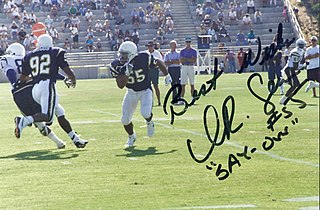
The 1994 San Diego Chargers season was the team's 35th, its 25th in the National Football League (NFL), and its 34th in San Diego. It would be the first season the franchise would have involving long snapper David Binn. He would play 17 seasons as a San Diego Charger, a franchise record.
The 1993 San Diego Chargers season was the team's 34th season, their 33rd in San Diego, and 24th in the National Football League.
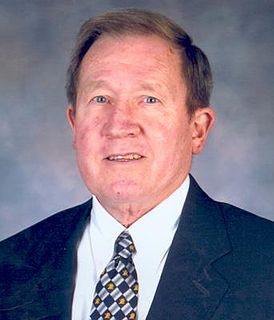
The 1992 San Diego Chargers season was the team's 33rd season, their 32nd in San Diego, and 23rd in the National Football League.
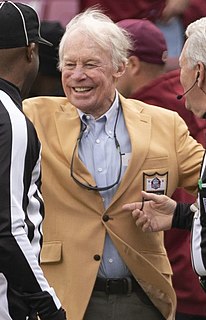
The 1991 San Diego Chargers season was the franchise's 22nd season in the National Football League (NFL), the 32nd overall and the third and final season under head coach Dan Henning. The team failed to improve on their 6–10 record in 1990, losing eight of their first nine games and finishing at 4-12, their fourth consecutive losing season.

The 1990 San Diego Chargers season was the franchise's 21st season in the National Football League (NFL) and its 31st overall. After a 1–4 start, the Chargers recovered to 5–5, only half a game out of the playoff picture. Five losses in their final six games, however, saw them finish with a 6–10 record for the third consecutive season. Only one of San Diego's six victories came against a team with a winning record, and none were against eventual playoff teams. As had been the case in 1989, close finishes were a problem—the Chargers were 0–5 in games decided by seven points or fewer.
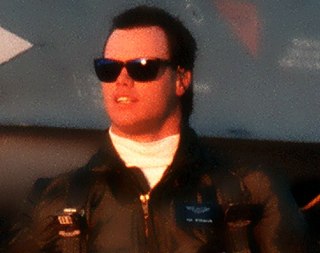
The 1989 San Diego Chargers season was the franchise's 20th season in the National Football League (NFL), its 30th overall and the first season under head coach Dan Henning, whose predecessor, Al Saunders, had been fired shortly after the previous season.

The 1988 San Diego Chargers season was the franchise's 19th season in the National Football League, its 29th overall and the second and final full season under head coach Al Saunders.
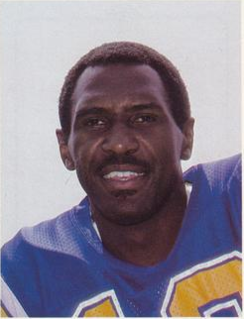
The 1976 San Diego Chargers season was the franchise's seventh season in the National Football League (NFL), and its 17th overall. The Chargers improved on their 2–12 record from 1975 and finished 6–8, but missed the playoffs for the 11th straight season. The Chargers started off the season by winning their first 3 games, but they struggled through the rest of the season by losing 8 of their last 11 games, which included 4 shutout losses, two of which were to division rival Denver.

The 1975 San Diego Chargers season was the franchise's sixth season in the National Football League (NFL), and its 16th overall. The team were seeking to improve on their 5–9 record in 1974, but they lost their first eleven games amidst attendances under 30,000. The team were also beset with considerable off-field problems, as several regular players wanted to leave and the franchise knew it would not get the first choice in the 1976 draft due to the expansion Seahawks and Buccaneers.

On January 14, 2007, the New England Patriots and the San Diego Chargers played an AFC Divisional Playoff game at Qualcomm Stadium in San Diego, California. The game is remembered for a play that occurred midway through the 4th quarter. On 4th and 5 with 6:25 remaining and the Chargers leading 21–13, Patriots quarterback Tom Brady was intercepted at the Chargers' 30-yard line by safety Marlon McCree, only for McCree to be stripped of the ball shortly thereafter by wide receiver Troy Brown. Fellow wide receiver Reche Caldwell recovered the fumble, securing a new set of downs for the Patriots. The Patriots' reborn drive would end in a touchdown and ensuing two-point conversion, and the Patriots went on to win 24–21 after Chargers kicker Nate Kaeding missed a last-second 54-yard field goal.












